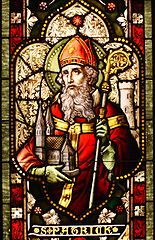
The Life And Writings Of Saint Patrick -Saint Patrick
II.—PATRICK VISITS DUBTHACH
Patrick had now traversed a large portion of Hy Cennselagh; but, although he had placed Iserninus at Aghade, we are not informed that he placed any bishop at Rathvilly or in any other portion of the royal territory. So he must now find a bishop for that territory, and it was not easy to do so, for his family had been quite depleted by previous appointments, and just then he had no candidate-bishop for the office in South Leinster.
The interview between the Saint and the arch-poet is highly interesting. The version given in the Book of Armagh is probably the most authentic.
When Patrick met Dubthach he besought the poet to recommend to him a suitable person to be made bishop from amongst his own disciples. The chief poet of Erin had a large school of bards under his direction. The course of training continued for many years, and the disciples usually accompanied the master when making his rounds. But Dubthach was now growing old, for he was chief poet of Erin when he first met Patrick at Tara some fifteen years before and rose up to do him honour against the king’s command. Fiacc was there, too, a mere stripling at the time, but already in training for the bardic order. He was a nephew of the king-poet, being his sister’s son, and hence was from the beginning a special favourite of Dubthach.
It would appear, too, that the old bard had destined Fiacc to be his successor in the office of chief poet of Erin, and on this occasion we find that Fiacc and ‘his school’ were making their bardic round in Connaught, and collecting the gifts of the nobles for themselves and the chief poet, which no one ventured to refuse to an order of men so dreaded, so influential, and, we may add, so rapacious. It is not unlikely, too, that Patrick in making this request had himself his eye on Fiacc as suitable material of a bishop, but he preferred that the suggestion should come from Dubthach rather than from himself. He asked for one of the bardic school, because the young Bards were the best educated men of the time except, perhaps, the Druids; but Patrick would, of course, have nothing to do with the latter. Their memory was highly trained, they certainly knew how both to read and write, their minds were stored with the songs and traditions of the nation’s past history, and their knowledge both of declamation and music would be of use in the ministry of the young Church of Erin.
So Patrick asked the chief poet to recommend him one of his bardic school, who would be ‘a free man, of good lineage, without defect, without blemish, whose wealth is not too little or too much’—that is, a man of moderate means. He added, too, in the language of St. Paul, that he should be a man of one wife, that is not twice married, and the Book of Armagh makes Patrick add—what certainly St. Paul did not say—that he should have only one child born to him. The description, however, of a suitable candidate seemed to point especially to Fiacc, and so the arch-poet understood it, for he at once replied, “I know no such man of my ‘school’ or household, except it be Fiacc the Fair of Leinster, and he has gone from me—on his bardic rounds—into the lands of Connaught.” The archpoet had pupils from all Ireland, and hence he describes Fiacc Finn, his nephew, as a Leinster man, and therefore specially suited to be a bishop in Leinster.

 Keep Site Running
Keep Site Running